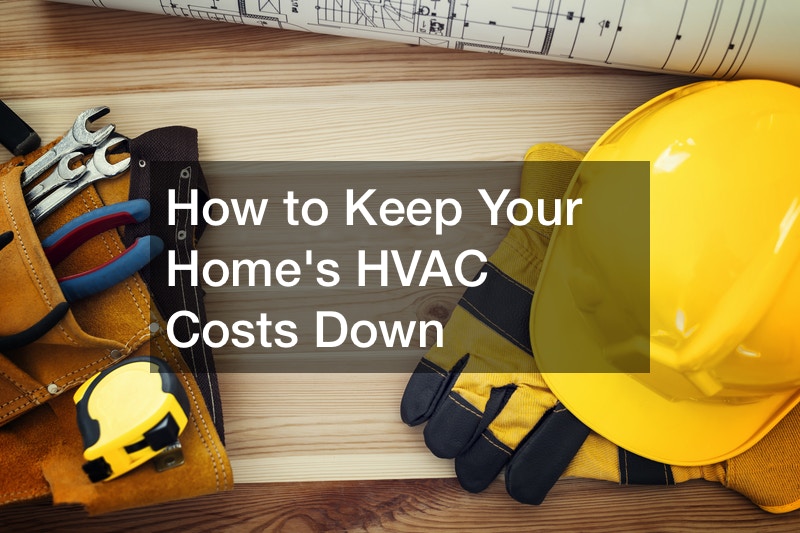

When the temperatures rise in summer and plummet in winter, you rely on your trusted HVAC system to keep you comfortable inside your home. Even if the outside temperatures reach the most extremes, an HVAC system can both cool and warm the air as needed. However, as it works hard to keep the temperature ambient in your home, the HVAC system can hike up your energy bills. To help you keep the HVAC running efficiently and save you some cash in the process, here are a few tips on what to do to make sure you get the most out of your heating system.

Have Your HVAC System Maintained
The best and most efficient way to ensure low energy bills is to maintain your HVAC unit properly. You can schedule an air conditioning maintenance service with your local HVAC service company to ensure optimal running of the unit. Regular, comprehensive service by a licensed air conditioner technician will ensure that there are no leaks in your system, all the wiring and electrical connections are intact, and that the thermostat is set to the optimum temperature to generate efficient operation.
The HVAC system should be serviced at a minimum once a year, depending on the type of system you have installed, especially if it is running all year round. The standard AC furnace should have maintenance service done at least once a year, while a technician maintains the newer heat pump designs every six months.
Remember that spending a little cash on the technician’s service fee will be easily recouped by having a lower energy bill every month.
Repair HVAC Problems Early On
There is a saying, “a stitch in time saves nine.” It is especially true when dealing with complex heating/cooling HVAC systems. A regular maintenance schedule will help you discover any components that are about to break, saving you the inconvenience and expense of having to fix a broken unit as an emergency. After all, it isn’t easy to live without an air conditioning system. You may not pay much attention to it while it is working, but when it breaks down, all hell breaks loose.
Most repairs need to be done by an air conditioning contractor because the HVAC’s complex system has many components, and some are connected to high voltage, so you don’t want to mess with those in case you get electrocuted. Some minor checks you can do yourself before you call in the technician to make sure it isn’t something minor that is broken.
If you have a furnace installed to heat your house, and your house is still cold, there are some things you can check yourself before calling the heating repair services. First, check that your thermostat is working. It should be set in the HEAT position. Also, check that the temperature on the thermostat is higher than the current temperature inside your home. If the temperature on the thermostat is set to lower or the same as the temperature inside your house, the unit will not switch on. Make sure that there is power getting through to the furnace by turning ON the fan; if nothing is happening and the fan does not come on, the unit is not getting power, and it is a definite sign that you may have to call someone for furnace repair.
Furnaces are the most common heating units used to heat residential homes. If your furnace is more than a couple of years old, it probably is no longer as efficient as it could be. The newer units are far more efficient, with their efficiency rated by AFUE (Annual Fuel Utilization Efficiency), which measures the percentage of energy used that actually goes into heating the home. The higher the AFUE rating, the more energy is harnessed to heat the house.

Install an Energy-Efficient HVAC System
Energy-efficient HVAC systems are those units that use the least amount of energy while providing the most comfortable temperature inside your home. It makes sense to buy a unit that uses energy efficiently if you want to keep your HVAC cost down. If you look around appliance stores these days, many appliances like washing machines, dryers, fridges, stoves, air conditioners, and HVAC systems bear the ENERGY STAR logo. When you see that logo, it means that this appliance exceeds the federal minimum standards for energy efficiency. These appliances use newer technology that enables them to use less energy to perform at their best. When you contemplate an air conditioning installation in your home, installing one of these energy-efficient units will help keep your energy costs down right off the bat. You may reduce your HVAC running costs up to 20% by installing one of these newer models.
If you are looking for the most energy-efficient system, you may want to install the most efficient system of 2021, the Geothermal open or closed-loop system. It uses the stable temperature below the earth’s surface to cool and heat your home. Even though the earth’s surface temperature may have wide seasonal variations at a depth of about 1.8 meters or six feet, the earth’s temperature changes are only moderate (between seven and 24 degrees C or 45-75 degrees F). Utilizing this source of moderate temperature lessens the burden of heating or cooling air by using other forms of energy.
The Geothermal open-loop system is suitable for properties situated near a body of water like a well, pond, or lake because it uses the water to transfer thermal energy into your home. The closed system uses a series of pipes sunk below the earth’s surface that are filled with anti-freeze-like liquid, and the liquid transfers the energy to a geothermal heat pump that is used to heat or cool your home. According to the sales material, installing a Geothermal system can save 50 -70% in energy costs per year.
If you live in a moderate climate, where the temperatures do not fall too low in winter or rise too high in summer, you may consider installing only a heat pump in your home instead of the complete HVAC system. The heating services provided may be enough to keep you comfortable in your home throughout the year.

Make Sure Your Attic Is Insulated
If you are really serious about reducing your home’s HVAC costs, you need to insulate your attic. Department of Energy estimates that up to 85% of heat in the home is lost through the ceiling into the attic. They also estimate that insulating your attic can save between 10 and 50% on your heating costs.
While you are tinkering up in the attic, checking your roof’s insulation is also a good idea. If the insulation material is old or torn, perhaps replace it. Insulating your roof takes care of more than just decreasing your heating bill in winter. It also protects your roofing material from damage by condensation. When your roof is not insulated properly, the warm air from the inside of the house meets the cold air outside and small droplets of condensation form on the inside surface of the roofing material. These droplets can build up and damage your roof covering. If your roof is well insulated, the heat transfer doesn’t occur, and it helps your roof last longer.
For this task, it is a good idea to call in a specialist roofer, who will check the integrity of your roof tiles as well as the insulation. There is no point in replacing the insulation material if your roof tiles are cracked. Spotting these cracks before they have a chance to become large holes will prevent unexpected leaks, and a large repair bill after a winter storm causes water damage to your roof and home.
Change Air Filters Regularly
When you want to keep your HVAC energy costs down, don’t forget to change its filters regularly. A dirty, clogged-up filter not only reduces the effectiveness of your unit but also can lead to dirty air circulating in your home. Disease-causing pathogens may multiply in the dirty filter and circulate throughout your house. Your family members may fall ill due to breathing contaminated air.
Dirty air filters reduce the airflow around the heat exchanging components and cause the fan to use more electricity to move the air. The unit uses more electricity, and not to mention that both the motor and the fan are taking strain which may lead to premature system failure.
Don’t Forget to Check the Belt
The fan component of the HVAC system will be connected to the motor via a belt. Besides air filters, belts are the most likely to suffer neglect and are prone to wear and tear damage over time. If the fan belt is worn or snaps, the unit stops working, resulting in costly repairs.
The slipping belt can also increase the energy needs of your HVAC unit, and your unit may start making strange noises while running, making it difficult to live with.

Install a Smart Thermostat
Obviously, you want to have a pleasant temperature in your home when you are there. But heating or cooling your home when nobody is there is a waste. Installing a Smart Thermostat that you can control through your tablet or phone will ensure that you can control the temperature settings remotely. This way, you can turn down the heat when you are at work and turn it up before you return home so that the HVAC does not have to use as much energy to maintain the temperature in the hours you are away. Letting the air conditioner work only when you are at home will lead to significant savings in the cost of energy.
Similarly, block and shut off the registers for those rooms that you are not using. For example, if you have a storage room or guest room where nobody spends much time, there is no point for those spaces to be the same ambient temperature as the rest of the house. Such small changes will allow your HVAC system to use less energy to keep the rest of your home comfortable.
Also, turn down your thermostat for the night. You may gain at least 1% of the total bill if you reduce the temperature by 1 degree Fahrenheit for an 8-hour period. So, if you are prepared to sleep in some flannel pajamas and cover with some additional blankets, the savings can be yours.
Seal the Air Ducts
The ducts that distribute the warmed or cooled air around your living space need to be inspected and sealed if needed. Unsealed air ducts can cause up to 20% of the heat loss. Pay special attention to the ductwork in the attic, the crawl space, and the unheated basement or garage, where the differences in temperature will be the greatest. You can use products like mastic sealant or foil tape to seal the duct along its length. Once the seams are securely sealed, wrap insulating material over the ducts to further prevent temperature loss as the air moves through.
At the same time as you are sealing the ducts, check that the heat registers are not blocked. If furniture or ornaments block the air outlets, you may need to rearrange your decor. Air needs a clear path to circulate for your HVAC system to be efficient. Any obstacles will make it use more energy than it should.
The cooling and heating of your home can stack up as much as 50% of your total electricity bill. Therefore, it is wise to ensure that you do everything possible to make your HVAC system run as efficiently as possible to reduce running costs. Any money you invest in making your unit run more efficiently, you will recoup by paying less in monthly bills. Being proactive with maintenance will also increase the life span of the HVAC system, reducing the costs of repairs and replacement costs for units that break prematurely.


